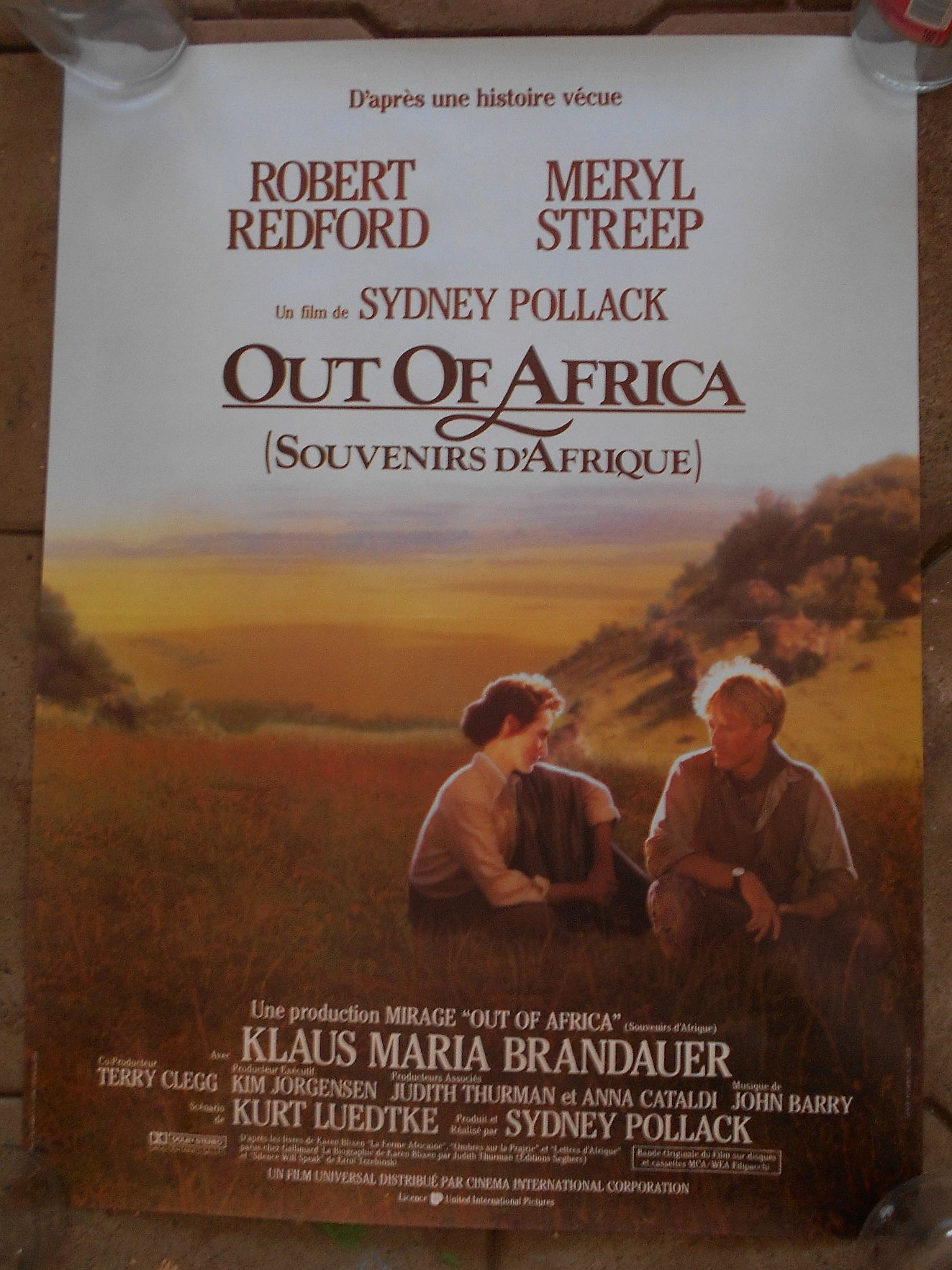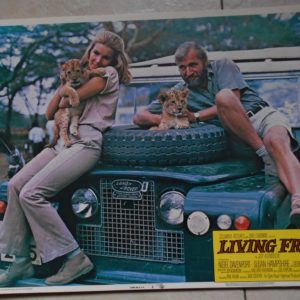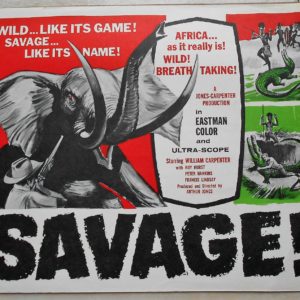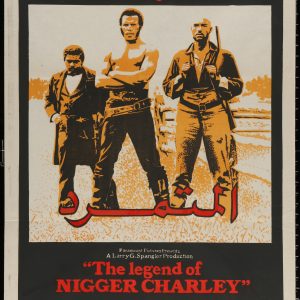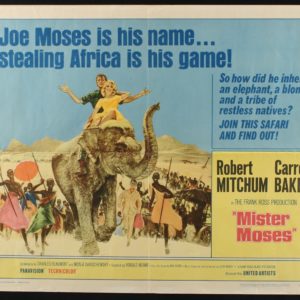Description
Out of Africa is a 1985 American epic romantic drama film directed and produced by Sydney Pollack, and starring Robert Redford and Meryl Streep. The film is based loosely on the autobiographical book Out of Africa written by Isak Dinesen (the pseudonym of Danish author Karen Blixen), which was published in 1937, with additional material from Dinesen’s book Shadows on the Grass and other sources.
The book was adapted into a screenplay by the writer Kurt Luedtke, and directed by the American Sydney Pollack. Streep played Karen Blixen; Redford played Denys Finch Hatton; and Klaus Maria Brandauer played Baron Bror Blixen. Others in the film included Michael Kitchen as Berkeley Cole; Malick Bowens as Farah; Stephen Kinyanjui as the Chief; Michael Gough as Lord Delamere; Suzanna Hamilton as Felicity, and the model/actress Iman as Mariammo. It was filmed in 1984. Despite mixed reviews from critics, Out of Africa won seven Academy Awards including Best Picture and Best Director for Pollack.
Plot
Karen Blixen recalls her life in Africa where in 1913 she, as an unmarried wealthy Danish woman, is spurned by her Swedish nobleman lover, and moves to Nairobi, British East Africa to complete a marriage of convenience with her lover’s brother, Baron Bror Blixen (Klaus Maria Brandauer). Bror has gone through his money and is reduced to seducing the servant girls; the couple plans to establish a dairy cattle farm. En route to Nairobi, she meets Denys Finch Hatton, a local big-game hunter.
It is Farah that greets her at the train station; Bror is nowhere to be found. So, at Muthaiga Club, she enters the men’s bar to ask for him, and she is asked to leave. Karen and Bror marry before the day is out in a “long” ceremony. As Baroness Blixen she learns that Bror has changed their agreed upon plan, to instead establish a coffee farm. However, his interest is more in running big game hunting on safari than at management of the farm.
Eventually, Karen does develop feelings for Bror, but she contracts syphilis from him during the First World War. Bror agrees to manage the farm while she takes treatment in Denmark. When she returns, he resumes working on safari. They begin to live separately.
The relationship between Karen and Denys develops, and he comes to live with her. Karen and Bror get a divorce. When Denys invites a mutual woman friend on safari, Karen comes to realize that Denys does not want the same type of relationship she seeks. He assures her that when he is with her he wants to be with her, and that a marriage is immaterial to their relationship. He moves out.
The farm eventually yields a good harvest, but a fire greatly damages Karen’s farm and causes her tremendous financial harm. Karen prepares for her departure from Kenya Colony to Denmark by appealing for land for her Kĩkũyũ workers to allow them to stay together, and by selling at a rummage sale the things that she will not take with her to Denmark.
Before the rummage sale, Denys visits the empty house and Karen comments that the house should have been so all along; Denys says that he was just getting used to her things. They agree that the coming Friday Denys will fly her to Mombasa; Karen to continue on to Denmark. Friday comes; Bror arrives to tell her that Denys’ biplane has crashed and burned.
Following the funeral, she goes to Denys’ club to complete arrangements for managing any mail that in her absence may arrive; the members extend to her a toast. At the train station, she says goodbye to Farah, then turns back to ask him to say her name.
Karen later became an author and a storyteller, writing about her experiences in Africa, though she never was to return.
Cast
Meryl Streep as Baroness Karen von Blixen (née Dinesen)
Robert Redford as Denys Finch Hatton
Klaus Maria Brandauer as Baron Bror von Blixen & Baron Hans von Blixen
Michael Kitchen as Berkeley Cole
Shane Rimmer as Belknap
Malick Bowens as Farah Aden
Joseph Thiaka as Kamante
Stephen Kinyanjui as Chief Kinanjui
Michael Gough as Hugh Cholmondeley, Lord Delamere
Suzanna Hamilton as Felicity Spurway
Rachel Kempson as Sarah, Lady Belfield
Graham Crowden as Henry, Lord Belfield
Benny Young as Minister
Leslie Phillips as Sir Joseph Aloysius Byrne
Annabel Maule as Lady Byrne
Iman as Mariammo
Production
The film tells the story as a series of six loosely coupled episodes from Karen’s life, intercut with her narration. The final two narrations, the first a reflection on Karen’s experiences in Kenya and the second a description of Finch Hatton’s grave, were taken from her book Out of Africa, while the others have been written for the film in imitation of her very lyrical writing style. The pace of this film is often rather slow, reflecting Blixen’s book, “Natives dislike speed, as we dislike noise…”[3]
Klaus Maria Brandauer was director Sydney Pollack’s only choice for Bror Blixen, even having trouble to pick a replacement when it appeared that Brandauer’s schedule would prevent him from participating. Robert Redford became Finch Hatton once Redford thought he had a charm no British actor could convey. Meryl Streep landed the part by showing up for her meeting with the director wearing a low-cut blouse and a push-up bra, as Pollack had originally thought the actress did not have enough sex appeal for the role.[4]
Out of Africa was filmed using descendants of several people of the Kikuyu tribe who are named in the book, near the actual Ngong Hills outside Nairobi, but not inside of Karen’s (second) three-bedroom house “Mbagathi” (now the Karen Blixen Museum). The filming took place in her first house “Mbogani”, close to the museum, which is a dairy today. A substantial part of the filming took place in the Scott house, which is still occupied, and a recreation of 1910s Nairobi built across a year. The scenes depicting the Government House were shot at Nairobi School with the administration block providing a close replica of British colonial governors’ residences.[5] The scenes set in Denmark were actually filmed in Surrey, England.
Historical differences
This section does not cite any sources. Please help improve this section by adding citations to reliable sources. Unsourced material may be challenged and removed. (February 2018) (Learn how and when to remove this template message)
This film quotes the start of the book, “I had a farm in Africa, at the foot of the Ngong Hills” [p. 3], and Karen recites, “He prayeth well that loveth well both man and bird and beast” from The Rime of the Ancient Mariner, which becomes the epitaph inscribed on Finch Hatton’s grave marker [p. 370].
This film differs significantly from the book, leaving out the devastating locust swarm, some local shootings, and Karen’s writings about the German army. The production also downplays the size of her 4,000 acres (16 km2) farm, with 800 Kikuyu workers and an 18-oxen wagon. Scenes show Karen as owning only one dog, but actually, she had two similar dogs named Dawn and Dusk.
The film also takes liberties with Denys and Karen’s romance. They met at a hunting club, not in the plains. Denys was away from Kenya for two years on military assignment in Egypt, which is not mentioned. Denys took up flying and began to lead safaris after he moved in with Karen. The film also ignores the fact that Karen was pregnant at least once with Finch Hatton’s child, but she suffered from miscarriages. Furthermore, Denys was an English aristocrat, but this fact was downplayed by the hiring of the actor Robert Redford, an inarguably all-American actor who had previously worked with Pollack. When Redford accepted the contract to play, he did so fully intending to play him as an Englishman. Pollack, however, felt an English accent would be distracting for the audience, and told Redford to use his real accent. In fact, Redford reportedly had to re-record some of his lines from early takes in the filming, in which he still spoke with a trace of English accent.
The title scenes of the film show the main railway, from Mombasa to Nairobi, as travelling through the Kenyan Rift Valley, on the steep back side of the actual Ngong Hills. However, the real railway track is located on the higher, opposite side of the Ngong Hills. The passenger car was actually a small combination office / sleeper that was originally used by supervisors during the building of the Uganda Railway and was the actual car from which a man was taken and killed by a marauding lioness.
Soundtrack
Out of Africa
Soundtrack album by John Barry
Varèse Sarabande
The music for Out of Africa was composed and conducted by veteran English composer John Barry. The score included a number of outside pieces such as Mozart’s Clarinet Concerto and African traditional songs. The soundtrack garnered Barry an Oscar for Best Original Score and sits in fifteenth place in the American Film Institute’s list of top 25 American film scores.[6] The soundtrack was released through MCA Records and features 12 tracks of score at a running time of just over thirty-three minutes. A rerecording conducted by Joel McNeely and performed by the Royal Scottish National Orchestra was released in 1997 through Varèse Sarabande and features eighteen tracks of score at a running time just under thirty-nine minutes.
Technical notes
In the Director’s Notes on the DVD of Pollack’s 2005 film The Interpreter, Pollack himself stated that he filmed Out of Africa and his later films of that decade in 1.85:1 widescreen; and that it “…probably was one I should have had in widescreen” (i.e. anamorphic 2.39:1 widescreen). In his director’s notes, Pollack stated that prior to the filming of Out of Africa, he made motion pictures exclusively in the anamorphic 2.39:1 widescreen format and style, and that he did not resume the anamorphic 2.39:1 widescreen format until his movie, The Interpreter, in 2005.
Release
Reception
Out of Africa received mixed reviews from critics.
The film currently holds a 57% “rotten” rating on Rotten Tomatoes, based on 47 reviews, with an average rating of 6.6/10. Out of Africa is one of only a handful of films that won the Academy Award for Best Picture but currently have “rotten” (below 60%) scores on Rotten Tomatoes.
Accolades
Academy Awards
The film won seven Academy Awards and was nominated in a further four categories.
Won
Best Picture (Sydney Pollack)
Best Director (Sydney Pollack)
Best Art Direction (Stephen B. Grimes, Josie MacAvin)
Best Cinematography (David Watkin)
Best Adapted Screenplay (Kurt Luedtke)
Best Original Score (John Barry)
Best Sound (Chris Jenkins, Gary Alexander, Larry Stensvold, Peter Handford)
Out of Africa (film)
From Wikipedia, the free encyclopedia
Jump to navigationJump to search
Out of Africa
Out of africa poster.jpg
Theatrical release poster
Directed by Sydney Pollack
Produced by Sydney Pollack
Kim Jorgensen
Screenplay by Kurt Luedtke
Based on Out of Africa
by Isak Dinesen
Isak Dinesen: The Life of a Story Teller
by Judith Thurman
Silence Will Speak
by Errol Trzebinski
Starring
Robert Redford
Meryl Streep
Klaus Maria Brandauer
Music by John Barry
Cinematography David Watkin
Edited by Fredric Steinkamp
William Steinkamp
Pembroke Herring
Sheldon Kahn
Production
company
Mirage Enterprises
Distributed by Universal Pictures
Release date
December 18, 1985
Running time
161 minutes
Country United States
Language English
Swahili
Budget $28 million
Box office $227.5 million
